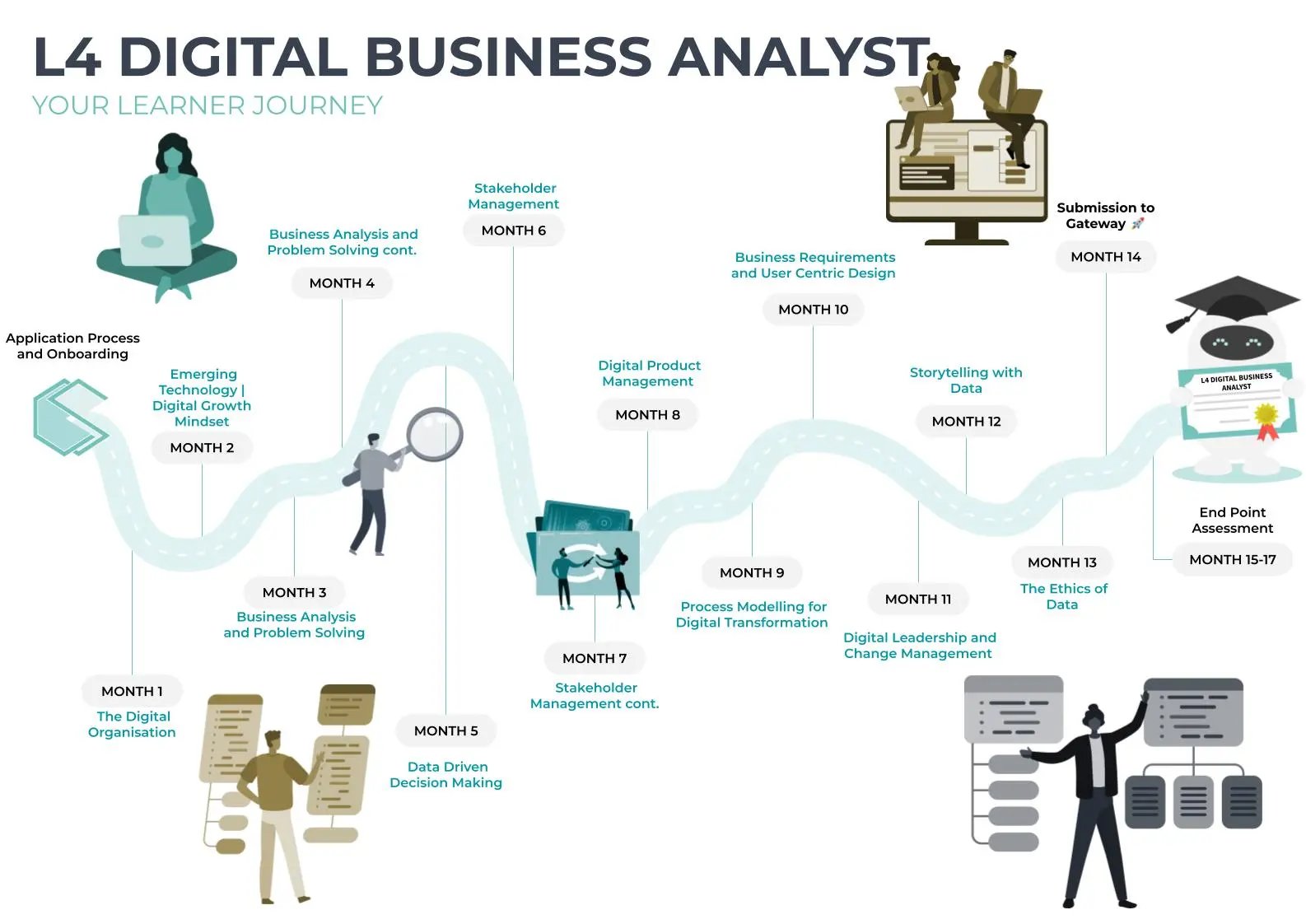According to the Bureau of Labor Statistics, employment of management analysts, which includes business analysts, is projected to grow 10% from 2022 to 2032. And no doubt publicly funded apprenticeships will continue to help organisations meet this growing skills need.
When it comes to upskilling aspiring business analysts through apprenticeships, your role as a manager is an important one. You can ensure both the learners on your team and your organisation reap the considerable benefits from the programme.
You can also significantly influence your team’s progress on an apprenticeship. You can guide learners in balancing studies and workload. And you can help identify projects that not only develop learners’ careers but also drive real business impact.
Before we talk about your role in guiding business analyst apprentices, let’s first understand their journey and how you can help them overcome challenges along the way.
Understanding the business analyst apprentice's journey
As analysts dive into the world of digital business analysis, they may encounter several challenges. These challenges can impact their learning and professional growth and can range from technical issues to communication and psychological barriers.
Fortunately, with the guidance and support of you, their line manager, and the team at Cambridge Spark, apprentices can navigate these challenges successfully. And therefore, they emerge as skilled and confident business analyst professionals at the end of their apprenticeship.
Here are some examples of these challenges and how you as a line manager can support learners through them:
1. Limited domain knowledge
Challenge: Apprentices may not have domain-specific knowledge related to the organisation's industry. This can potentially hinder their ability to analyse and interpret data effectively.
Manager's role: Line managers can facilitate cross-functional learning opportunities. You can encourage apprentices to attend industry-related events or conferences and provide access to domain-specific materials. You can also encourage apprentices to connect with experienced colleagues who can share their expertise.
2. Imposter syndrome
Challenge: Many apprentices may experience imposter syndrome, doubting their abilities and feeling inadequate compared to more experienced team members.
Manager's role: As a line manager, you can provide regular feedback and recognition for achievements, remind apprentices of their progress, and create a supportive and inclusive team culture where questions and mistakes are viewed as opportunities for growth.
3. Balancing learning and work
Challenge: Juggling learning, work responsibilities, and meeting project deadlines can be challenging.
Manager's role: You can help apprentices break down complex projects into manageable tasks, prioritise work, and set realistic expectations regarding project timelines. You should also monitor workload and ensure that apprentices receive necessary support to avoid burnout.

4. Lack of exposure to real-world projects
Challenge: Apprentices with limited past experience may struggle to apply theoretical knowledge to real-world projects.
Manager's role: With the guidance of apprenticeship mentors, you should gradually introduce apprentices to practical projects relevant to your organisation. You can then provide constructive feedback throughout the process.
Now you’ve seen some of the challenges learners will inevitably meet in their journey. Let’s talk about setting realistic expectations for their progress.
Setting realistic expectations for business analyst apprenticeship progress
Be sure to set realistic expectations of how quickly your organisation may see impact from enrolling staff in this apprenticeship.
Learners on Cambridge Spark’s business analyst apprenticeship are required to complete a minimum of 6 hours of off-the-job training every week.
Off-the-job training occurs outside regular work duties but within normal working hours either at the learner’s place of work or home. The weekly minimum of 6 hours allows learners to concentrate on developing necessary skills, knowledge, and behaviours for programme completion.
Part of your role as their manager is to ensure that learners complete their off-the-job training.
Look at these hours as time your team is investing in acquiring more expertise in their roles. The more off-the-job training learners complete each week, the sooner you will generally see a return on that time investment for your organisation.
What qualities make a line manager an effective mentor?
An effective mentor should possess a combination of qualities that not only reflect their expertise in the field but also their ability to guide, support, and inspire others.

Here are some key qualities and actions managers can take that make for an effective mentor in this context:
- Understanding of business needs: You should have a strong grasp of your organisation's business goals and strategies to help apprentices align their projects with company objectives.
- Knowledge of the apprenticeship programme: Be sure that you thoroughly understand the structure, goals, and requirements of the business analyst apprenticeship programme. Having this knowledge empowers you to provide your team with informed and adequate guidance.
- Employee development focus: Great mentors are dedicated not just to their team or organisational impact, but to the professional development of their employees as well. Help your employees acquire the skills and experience needed to excel in their roles.
- Feedback and performance evaluation: Providing regular feedback on apprentices' performance and progress is essential to effectively mentoring them through the programme. We suggest managers schedule regular one-to-one meetings with apprentices, providing a platform to discuss their progress.
You might also want to participate in a 30-minute general catch-up session every 3-4 months. These sessions ideally involve the apprentice, their coach and their line manager to gain insights into the overall learner progress.
The role of mentorship doesn’t fall solely on your shoulders. Any decent apprenticeship provider should have their own system for guiding and supporting learners. And next up, we’ll see why Cambridge Spark’s system is one of the best.
Cambridge Spark mentorship and guidance
Part of Cambridge Spark's mission is to provide comprehensive support to learners, ensuring their successful completion of apprenticeships. To achieve this, we have established a three-tiered support system, consisting of trainers, mentors, and coaches.
Within this system, each part plays a distinct role in guiding learners through their upskilling journey. One aspect of delivery that sets us apart from other providers is our deliberate separation of roles between coaches and mentors.
This separation enables mentors to focus exclusively on fostering the development of their learners' technical data skills. This is a unique approach that distinguishes our support system from alternatives where both roles are held by just one person.
Trainers
At Cambridge Spark, trainers primarily focus on delivering the content of apprenticeships through live sessions and through our EDUKATE.AI platform.
%20(1).webp?width=1050&height=591&name=Edukate.ai%20(1)%20(1).webp) While trainers may provide one-to-one support to learners in areas that require specific data expertise, their usual approach involves working on a cohort-to-cohort basis.
While trainers may provide one-to-one support to learners in areas that require specific data expertise, their usual approach involves working on a cohort-to-cohort basis.
Mentors
Every learner at Cambridge Spark is paired with a dedicated mentor who leverages their technical expertise to guide the learner through their projects. This guidance ensures that the projects not only align with apprenticeship standards, but also generate tangible impact within their respective organisations.
Mentors also play a crucial role in providing feedback on learners' written portfolios and preparing them for the End Point Assessment.

“One thing that surprised me was my coach and my mentor... having access to people that really care about what you're doing and really want to see you succeed. So you're never on your own. That is incredible.”
-Elle Neal, Apprentice at BPA Quality
Coaches
Coaches serve as the initial point of contact for any questions, queries, or concerns that learners may have throughout their apprenticeship. Each learner is assigned a dedicated coach for the entire duration of their programme.
%20(2).webp?width=150&height=150&name=Julie%20Clark%20(Coach)%20(2).webp)
"I always tell any new learners that as a coach, I am basically their cheerleader throughout the course."
-Julie Clark, Learner Success Coach at Cambridge Spark
Our coaches play a multifaceted role, aiding learners in navigating various platforms and supporting with time management and study plans. Coaches also guide learners in defining and staying focused on their course objectives.
Regular progress reviews offer an opportunity not only to measure programme outcomes but also to celebrate successes. If a learner falls behind, their coach will take proactive steps, creating smart actions to help them regain momentum and stay on track.
Conclusion
In summary, it takes a team of dedicated individuals to successfully guide a learner through their apprenticeship. A manager's role is vital in shaping a business analyst’s apprenticeship experience.
From adjusting schedules to addressing challenges, managers significantly impact apprentices' success. Setting realistic expectations and fostering effective mentorship qualities amplify this impact.
If you’re interested in upskilling your team with a Digital Business Analyst apprenticeship, get in touch.


